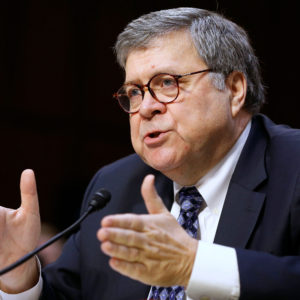Speaker of the House Nancy Pelosi declared recently that our nation faces a “constitutional crisis.” She may be right, but not for the reasons she claims. Congress’ near-total abandonment of its core legislative responsibilities poses far more of a constitutional risk than does anything the Trump administration has done.
Pelosi is not the first to claim we face an existential political crisis. Since the election of Donald Trump, Democrats have repeatedly insisted that our democracy is at risk — at risk to Russian collusion, voter suppression, executive abuse of power, press bashing and indifference to the rule of law, just to name a few of the presidential offenses provoking The Resistance. But the trigger for Pelosi’s raising the red flag of constitutional crisis is none of these perceived offenses, rather it is the president’s alleged interference with Congress’ oversight responsibilities.
From the founding, it was never doubted that Congress has an implied power to investigate and oversee the work of the executive branch. In 1927 the Supreme Court affirmed that “the power of inquiry — with process to enforce it — is an essential and appropriate auxiliary to the legislative function” … so long as the purpose is “to obtain information in aid of the legislative function.”
Although many of the continuing and proposed investigations are founded more in a deep hatred of Trump than in the pursuit of information relating to the legislative function, it is plausible that some of what might be learned could inform pending or future legislation. But if executive resistance to and obstruction of congressional oversight of the executive branch constitute a constitutional crisis, we have been in crisis mode for much of our history.
Most presidents have sought to expand executive authority. Congress has usually responded with investigations and resistance in the name of preserving legislative powers and confining the executive to its constitutional role. President Abraham Lincoln ordered the procurement of warships and expansion of the Army without appropriation of funds by Congress. President Theodore Roosevelt declared his powers to be “limited only by specific restrictions and prohibitions appearing in the Constitution or imposed by Congress under its constitutional powers,” and he governed accordingly. President Woodrow Wilson created several new federal agencies without congressional authorization. President Franklin Roosevelt promised in his first inaugural address that “in the event that Congress shall fail to (act) …, and in the event that the national emergency is still critical, I shall not evade the clear course of duty that will then confront me.” Like his namesake predecessor, FDR was true to his word, issuing 3,723 executive orders over his tenure. President Harry Truman ordered the seizure of the nation’s steel mills during the Korean War without authorization. In the same spirit of an imperial presidency, President Barack Obama famously declared “where they (Congress) won’t act, I will.” And he did, with over 600 executive orders during his two terms.
Occasionally the steady expansion of presidential power and the coinciding erosion of congressional power have been overturned in the courts, as it was in the steel seizure case. Both Obama and Trump have had their executive ambitions thwarted by the courts. But over the last several decades the courts have been generally deferential to executive assertions of power.
Meanwhile, Congress has done little to assert and defend its own constitutional authorities. Notwithstanding that Article I of the Constitution vests “all legislative powers” in Congress and Article II vests only the executive power in the president, the executive branch sets public policy and effectively legislates through executive orders, administrative directives and regulation with little objection from Congress. Indeed the members of Congress appear to welcome freedom from the hard political choices inherent in the legislative process.
If members of Congress are truly worried about executive abuses of power and presidential obstruction of their oversight function, they would do well to leave the evaluation of the Trump presidency and the vetting of President Trump to the voters and turn their attention to reasserting their constitutional authority to legislate and make public policy. Goodness knows there are ample problems for Congress to address.
Oversight is important, but not nearly as important as restoring the constitutional separation of powers on which our liberties depend. Trump often warrants the disdain congressional Democrats hold for him, but they do a disservice to their constituents when they abandon their legislative responsibilities to endless investigations and unbridled resistance.

